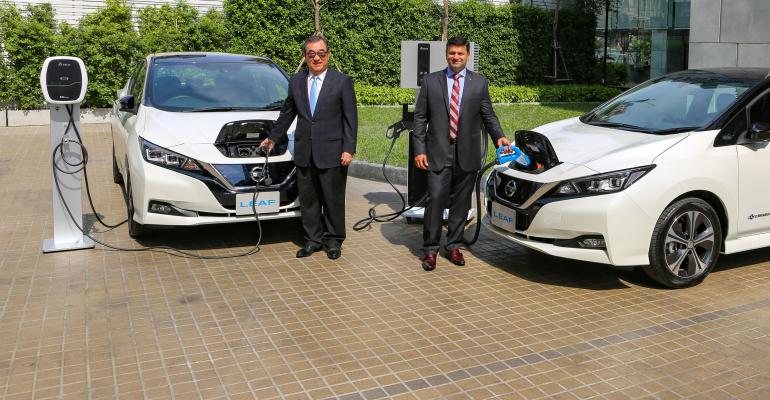BANGKOK – Nissan advances its plans to market the Leaf battery-electric vehicle in Thailand by naming Delta Electronics its primary provider of charging systems there.
The Nissan-Delta Electro Mobility Operator Agreement was signed by Ramesh Narasimhan, president-Nissan Motor Thailand, and Hsieh Shen-yen, president-Delta Electronics Thailand, in a ceremony in Bangkok.
Nissan believes the deal will help Thailand meet its goal of having 1.2 million EVs on the road by 2036.
The Japanese automaker is leading the way in efforts to make EVs, particularly the Leaf subcompact, a viable option for Thai customers. It’s been working for several years with industry stakeholders to prepare the ground in a country that still has minimal charging infrastructure.
Nissan already has partnered with the Metropolitan Electricity Authority to provide home charging.
The agreement will allow the Thai EV sector to match international standards, Narasimhan says. “This deal gives access to Delta’s comprehensive EV charging and site-management solutions already available to EV drivers in the U.S., Europe, Asia and Australia,” he says.
Nissan launched the Leaf, the world’s best-selling EV, in completely built-up format in Thailand at the end of the first quarter, and deliveries started earlier this month. It has committed to assembling an EV here within the next three years after signing up with the government’s investment privilege scheme.
Nissan considers building cars its core competence and has been seeking partners to provide charging infrastructure. It believes Thai consumers have varying requirements, and it wants to be able to offer the widest range of charging options.
Under the agreement, Delta will provide a 7.36-kW AC charger for home and workplace applications while public stations will offer its 50-kW DC quick charger. Delta also is providing AC and DC chargers to all the dealerships that upgrade to sell the Leaf.
“This is an important first step in Thailand for Nissan to build electrification infrastructure,” says Shen-yen. He believes Delta’s expertise in this area will give “confidence and peace of mind about the many charging options available to them.”
The chargers, which are exclusive to Nissan, will be manufactured in Thailand, Shen-yen says, adding, “We make a lot of EV car components in Thailand.”
Following the Leaf’s launch at the Bangkok auto show in March, sales are being managed by a first phase comprising 32 specialist dealers which, according to Narasimhan, “will be finished by the end of the month.”
Of those 32 dealers, 15 are in metropolitan Bangkok while the remainder are in major cities in Thailand’s northern, northeastern and southern regions.
Nissan has 128 Thai dealers in total (below, left) and Narasimhan has his eye on a continuous rollout. “We want to expand more dealerships (to support EVs) in the next couple of years and in the future, we would like all our dealers selling Leaf (models) and chargers … within three years.”
 Adding a second phase of dealers to support the Leaf already is in the works.
Adding a second phase of dealers to support the Leaf already is in the works.
Leaf-specific dealers have specialized sales staff and technicians as well as charging points for customers to use.
Although EVs so far have been Bangkok-centric, Narasimhan reveals “20% of sales are outside Bangkok, which surprised us. Customers outside of Bangkok think there is an application” for EVs.
“The possibilities of EV are fantastic in this country.”
Narasimhan has headed Nissan Thailand for just seven weeks. Previously he was president of Nissan Philippines. He joined Nissan in 2014 and also has held positions in the U.K., Australia and China. As part of his new position here he will oversee Nissan manufacturing plants, which supply cars to both the domestic market and over 100 export markets.





